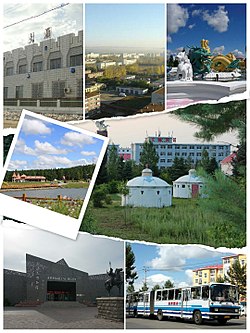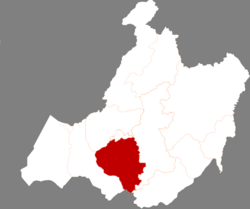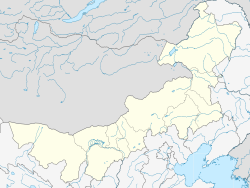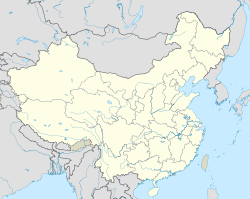Ewenki Autonomous Banner[3] or Evenk Autonomous Banner[4] (Evenki: ![]() ; Mongolian: ᠡᠸᠡᠩᠬᠢ ᠥᠪᠡᠷᠲᠡᠭᠡᠨ ᠵᠠᠰᠠᠬᠤ ᠬᠣᠰᠢᠭᠤ; Chinese: 鄂温克族自治旗) is an autonomous banner that lies on the border between northwestern Greater Khingan and Hulun Buir grasslands and directly south of the urban district of Hailar in the prefecture-level city of Hulunbuir, China.[1] The autonomous banner has an area of 19,111 km2 (7,379 sq mi),[1] and a population of 136,832 as of 2019.[5]: 20–1 The banner's seat of government is the town of Bayan Tohoi.[1] The most populous town in the banner is Dayan, which was once Dayan Mining Area as an administrative division and is now the main part of an industrial district also named Dayan Mining Area, has an area of 443 square kilometres (171 sq mi) and a population of about 73,000.[citation needed][clarification needed]
; Mongolian: ᠡᠸᠡᠩᠬᠢ ᠥᠪᠡᠷᠲᠡᠭᠡᠨ ᠵᠠᠰᠠᠬᠤ ᠬᠣᠰᠢᠭᠤ; Chinese: 鄂温克族自治旗) is an autonomous banner that lies on the border between northwestern Greater Khingan and Hulun Buir grasslands and directly south of the urban district of Hailar in the prefecture-level city of Hulunbuir, China.[1] The autonomous banner has an area of 19,111 km2 (7,379 sq mi),[1] and a population of 136,832 as of 2019.[5]: 20–1 The banner's seat of government is the town of Bayan Tohoi.[1] The most populous town in the banner is Dayan, which was once Dayan Mining Area as an administrative division and is now the main part of an industrial district also named Dayan Mining Area, has an area of 443 square kilometres (171 sq mi) and a population of about 73,000.[citation needed][clarification needed]
Ewenki Banner
| |
|---|---|
| Ewenki Autonomous Banner 鄂温克族自治旗 ᠡᠸᠡᠩᠬᠢ ᠥᠪᠡᠷᠲᠡᠭᠡᠨ ᠵᠠᠰᠠᠬᠤ ᠬᠣᠰᠢᠭᠤ • ᠧᠸᠧᠩᠺᠢ ᠠᠶᠢᠮᠠᠨᠨᠢ ᠮᠧᠧᠨᠵᠢ ᠵᠣᠬᠠᠷ ᠭᠣᠰ | |
 | |
 Ewenki Banner in Hulunbuir | |
| Coordinates (Ewenki Banner government): 49°08′48″N 119°45′19″E / 49.1468°N 119.7552°E | |
| Country | China |
| Autonomous region | Inner Mongolia |
| Prefecture-level city | Hulunbuir |
| Banner seat | Bayan Tohoi |
| Area | |
| • Total | 19,111 km2 (7,379 sq mi) |
| Population (2020)[2] | |
| • Total | 141,102 |
| • Density | 7.4/km2 (19/sq mi) |
| Time zone | UTC+8 (China Standard) |
| Postal code | 021100 |
| Website | www |
| Ewenki Autonomous Banner | |||||||
|---|---|---|---|---|---|---|---|
| Chinese name | |||||||
| Simplified Chinese | 鄂温克族自治旗 | ||||||
| Traditional Chinese | 鄂溫克族自治旗 | ||||||
| |||||||
| Mongolian name | |||||||
| Mongolian Cyrillic | Эвэнк өөртөө засах хошуу | ||||||
| Mongolian script | ᠡᠸᠡᠩᠬᠢ ᠥᠪᠡᠷᠲᠡᠭᠡᠨ ᠵᠠᠰᠠᠬᠤ ᠬᠣᠰᠢᠭᠤ | ||||||
| |||||||
| Evenki name | |||||||
| Evenki | ᠧᠸᠧᠩᠺᠢ ᠠᠶᠢᠮᠠᠨᠨᠢ ᠮᠧᠧᠨᠵᠢ ᠵᠣᠬᠠᠷ ᠭᠣᠰ Ewengki Aimanni Mvvngkeng Isihēr Gosa Эвенки Аймани Мвенкен Исихер Госа | ||||||
Administrative divisions
editThe banner is divided into 4 towns, 1 ethnic township, and 5 sums.[1][6][7] These subdivisions are further divided into 44 Gacha and 20 Residential Communities.[1] The banner's seat of government is the town of Bayan Tohoi.[1]
| Name | Simplified Chinese | Hanyu Pinyin | Mongolian (Hudum Script)[8][better source needed] | Mongolian (Cyrillic)[citation needed] | Administrative division code | Notes |
|---|---|---|---|---|---|---|
| Towns | ||||||
| Bayan Tohoi | 巴彦托海镇 | Bāyàntuōhǎi Zhèn | ᠪᠠᠶᠠᠨᠲᠣᠬᠣᠢ ᠪᠠᠯᠭᠠᠰᠤ | Баяндахуй балгас | 150724100 | |
| Dayan | 大雁镇 | Dàyàn Zhèn | ᠳ᠋ᠠ ᠶᠠᠨ ᠪᠠᠯᠭᠠᠰᠤ | Да яан балгас | 150724110 | |
| Imin Gol | 伊敏河镇 | Yīmǐnhé Zhèn | ᠢᠮᠢᠨ ᠭᠣᠣᠯ ᠪᠠᠯᠭᠠᠰᠤ | Имин гол балгас | 150724111 | |
| Hongholji | 红花尔基镇 | Hónghuā'ěrjī Zhèn | ᠬᠣᠩᠭᠣᠯᠵᠢ ᠪᠠᠯᠭᠠᠰᠤ | Хонголж балгас | 150724112 | |
| Ethnic township | ||||||
| Bayan Tal Daur Ethnic Township | 巴彦塔拉达斡尔民族乡 | Bāyàntǎlā Dáwò'ěr Mínzúxiāng | ᠪᠠᠶᠠᠨᠲᠠᠯᠠ ᠳᠠᠭᠤᠷ ᠦᠨᠳᠦᠰᠦᠲᠡᠨ ᠦ ᠰᠢᠶᠠᠩ | Баянтөл дагуур үндэстэний шиян | 150724213 | (Daur) Bayn tal Daor aimn tors |
| Sums | ||||||
| Bayan Qagan Sum | 巴彦嵯岗苏木 | Bāyàncuógǎng Sūmù | ᠪᠠᠶᠠᠨᠴᠠᠭᠠᠨ ᠰᠤᠮᠤ | Баянцагаан сум | 150724210 | |
| Xinhen West Sum | 锡尼河西苏木 | Xīníhéxī Sūmù | ᠰᠢᠨᠡᠬᠡᠨ ᠪᠠᠷᠠᠭᠤᠨ ᠰᠤᠮᠤ | Шинэхэн баруун сум | 150724211 | |
| Xinhen East Sum | 锡尼河东苏木 | Xīníhédōng Sūmù | ᠰᠢᠨᠡᠬᠡᠨ ᠵᠡᠭᠦᠨ ᠰᠤᠮᠤ | Шинэхэн зүүн сум | 150724212 | |
| Imin Sum | 伊敏苏木 | Yīmǐn Sūmù | ᠢᠮᠢᠨ ᠰᠤᠮᠤ | Имин сум | 150724214 | |
| Hui Sum | 辉苏木 | Huī Sūmù | ᠬᠤᠢ ᠰᠤᠮᠤ | Хой сум | 150724215 | |
Other: Bayan Tohoi Economic Development Zone (巴彦托海经济开发区)
Geography and Climate
editThe overwhelming majority of the banner's area is grassland, although the banner also includes a sizable amount of woodlands.[1][7] The banner experiences an average annual precipitation of 315 mm (12.4 in), and an average annual temperature of −2.4 °C (27.7 °F).[7]
| Climate data for Ewenki Autonomous Banner, elevation 621 m (2,037 ft), (1991–2020 normals, extremes 1981–2010) | |||||||||||||
|---|---|---|---|---|---|---|---|---|---|---|---|---|---|
| Month | Jan | Feb | Mar | Apr | May | Jun | Jul | Aug | Sep | Oct | Nov | Dec | Year |
| Record high °C (°F) | −0.7 (30.7) |
4.1 (39.4) |
16.3 (61.3) |
30.0 (86.0) |
34.1 (93.4) |
40.1 (104.2) |
40.1 (104.2) |
37.2 (99.0) |
33.8 (92.8) |
26.8 (80.2) |
13.0 (55.4) |
2.7 (36.9) |
40.1 (104.2) |
| Mean daily maximum °C (°F) | −19.7 (−3.5) |
−13.7 (7.3) |
−3.2 (26.2) |
9.8 (49.6) |
19.1 (66.4) |
25.2 (77.4) |
27.1 (80.8) |
24.9 (76.8) |
18.4 (65.1) |
8.0 (46.4) |
−6.0 (21.2) |
−17.0 (1.4) |
6.1 (42.9) |
| Daily mean °C (°F) | −25.6 (−14.1) |
−20.7 (−5.3) |
−10.2 (13.6) |
3.1 (37.6) |
12.0 (53.6) |
18.5 (65.3) |
21.0 (69.8) |
18.5 (65.3) |
11.2 (52.2) |
1.0 (33.8) |
−12.1 (10.2) |
−22.4 (−8.3) |
−0.5 (31.1) |
| Mean daily minimum °C (°F) | −30.1 (−22.2) |
−26.3 (−15.3) |
−16.4 (2.5) |
−3.3 (26.1) |
4.4 (39.9) |
11.4 (52.5) |
15.2 (59.4) |
12.8 (55.0) |
5.0 (41.0) |
−4.4 (24.1) |
−16.9 (1.6) |
−26.9 (−16.4) |
−6.3 (20.7) |
| Record low °C (°F) | −46.5 (−51.7) |
−42.6 (−44.7) |
−34.0 (−29.2) |
−22.4 (−8.3) |
−10.9 (12.4) |
−0.6 (30.9) |
4.1 (39.4) |
0.5 (32.9) |
−8.2 (17.2) |
−21.4 (−6.5) |
−39.0 (−38.2) |
−42.7 (−44.9) |
−46.5 (−51.7) |
| Average precipitation mm (inches) | 3.7 (0.15) |
3.5 (0.14) |
5.4 (0.21) |
12.6 (0.50) |
23.6 (0.93) |
51.0 (2.01) |
87.2 (3.43) |
82.2 (3.24) |
35.0 (1.38) |
15.5 (0.61) |
6.1 (0.24) |
6.4 (0.25) |
332.2 (13.09) |
| Average precipitation days (≥ 0.1 mm) | 8.1 | 5.3 | 5.3 | 6.2 | 7.8 | 11.6 | 13.6 | 12.4 | 9.2 | 6.6 | 6.9 | 9.7 | 102.7 |
| Average snowy days | 11.8 | 8.6 | 8.4 | 6.3 | 1.1 | 0.1 | 0 | 0 | 0.5 | 5.5 | 10.4 | 13.7 | 66.4 |
| Average relative humidity (%) | 72 | 72 | 65 | 49 | 44 | 56 | 66 | 68 | 62 | 60 | 70 | 73 | 63 |
| Mean monthly sunshine hours | 178.5 | 211.0 | 269.5 | 264.7 | 289.6 | 295.5 | 292.5 | 279.9 | 248.2 | 220.6 | 178.3 | 153.2 | 2,881.5 |
| Percent possible sunshine | 66 | 73 | 73 | 64 | 61 | 61 | 60 | 64 | 67 | 67 | 66 | 60 | 65 |
| Source: China Meteorological Administration[9][10] | |||||||||||||
Economy
editA number of local state-run enterprises are located in Ewenki Autonomous Banner, many of which deal with natural resources such as coal and lumber.[1] These enterprises include Huaneng Yimin Coal and Electricity Company, which produces thermal and photovoltaic electricity,[11] Shenhua Dayan Energy Group, and Inner Mongolia Tongda Coal Industry Corporation.[1]
Ewenki Autonomous Banner's gross domestic product totaled 10.69273 billion renminbi (RMB) as of 2019, a 2.3% increase from 2018.[5]: 20–30 Of this, 8.47% came from the autonomous banner's primary sector, 55.16% came from the secondary sector, and 36.37% came from the tertiary sector.[5]: 20–30
In 2019, households in the autonomous banner earned an average annual disposable income of 33,168 RMB.[5]: 20–30 The autonomous banner's urban households earned an average of 33,214 RMB in disposable income, ranking 58th out of the 101 county-level divisions in Inner Mongolia for which this statistic was reported;[5]: 20–5 and rural households in the autonomous banner earned an average of 24,926 RMB in disposable income, ranking 9th out of the 90 county-level divisions for which this statistic was reported.[5]: 20–6
Consumer retail sales in the autonomous banner totaled 2.06048 billion RMB as of 2019.[5]: 20–30
As of 2019, there were 21,204 mobile telephone subscriptions in the Ewenki Autonomous Banner, accounting for 14.50% of its total population, and 29,769 internet subscriptions, accounting for 21.76% of its total population.[5]: 20–30
In 2019, Ewenki Autonomous Banner earned 736.62 million RMB in public budget revenue, ranking 40th out of the 103 county-level divisions in Inner Mongolia.[5]: 20–4
Agriculture
editEwenki Autonomous Banner produced 49,145 tons of grain in 2019, ranking 71st out of the 96 county-level divisions in Inner Mongolia which for which this statistic was reported.[5]: 20–2 In the same year, the autonomous banner produced 17,749 tons of meat, ranking 57th out of Inner Mongolia's 103 county-level divisions.[5]: 20–3
Demographics
editAs of 2019, the autonomous banner's population of 136,832 ranks 71st out of Inner Mongolia's 103 county-level divisions.[5]: 20–1 This total was a 0.7% decline from the previous year.[5]: 20–30
Ethnicity
editThe autonomous banner's government reported in 2013 that ethnic minorities within the banner totaled 58,843 people, accounting for 40.8% of the total population.[1] In addition to the Han Chinese majority in the autonomous banner,[1] sizable minority communities include the Evenki, Mongol, Daur, Manchu, Hui, Korean, Oroqen, and Sibe people.[7]
| Ethnicity | Population[1] | Percentage[1] |
|---|---|---|
| Han Chinese | ~85,157 | 59.2% |
| Mongol | 27,809 | 19.3% |
| Daur | 14,239 | 9.9% |
| Evenki | 11,193 | 7.8% |
| Others | ~5,602 | 3.8% |
Education
editThe autonomous banner has 10 primary schools and 11 secondary schools.[5]: 20–30
Healthcare
editAs of 2019, Ewenki Autonomous Banner's medical institutions host 604 beds, and are staffed by 1,100 personnel.[5]: 20–30
Transport
editEwenki Autonomous Banner is served by 1,422 kilometres (884 mi) of highway as of 2019.[5]: 20–30
Dayan is crossed by the Hailar–Imin Railway,[7] the Harbin-Manzhouli railway,[citation needed] and highways G301 and G10.[citation needed] Hailar International Airport is the nearest airport.[citation needed]
Gallery
edit- Dayan Town
-
Places in Dayan
-
No.1 Colliery of Dayan in 1990s
-
Winter of Dayan
- The other Administrative Divisions in Evenk Banner
-
Ewenki Museum in the town of Bayan Tohoi
-
Hongholji National Forest Park
References
edit- ^ a b c d e f g h i j k l m n 鄂温克概况 (in Chinese). Ewenki Autonomous Banner People's Government. Archived from the original on 2020-05-31. Retrieved 2020-05-31.
- ^ Inner Mongolia: Prefectures, Cities, Districts and Counties
- ^ ""Sun Flower" handicrafts making brings warmth to poverty-stricken people". Xinhua. 2020-08-11.
Ewenki Autonomous Banner
- ^ "Inner Mongolia to host international circuit offroad championship". China Daily. 2017-11-25.
Evenk Autonomous Banner
- ^ a b c d e f g h i j k l m n o p 内蒙古统计年鉴—2020 [Inner Mongolia Statistical Yearbook 2020]. tj.mng.gov.cn (in Chinese). Inner Mongolia Autonomous Regional Bureau of Statistics. 2020. Archived from the original on 2021-07-13. Retrieved 2021-07-13.
- ^ 2019年统计用区划代码 (in Chinese). National Bureau of Statistics of the People's Republic of China. Retrieved 2020-05-31.
- ^ a b c d e 鄂温克族自治旗概况地图 (in Chinese (China)). XZQH.org. 2013-04-23. Retrieved 2020-05-31.
- ^ "Administrative Divisions of China in minority languages (Nei Mongol)". ttpedersen.github.io. Archived from the original on 2023-09-25. Retrieved 2023-09-25.
- ^ 中国气象数据网 – WeatherBk Data (in Simplified Chinese). China Meteorological Administration. Retrieved 10 October 2023.
- ^ 中国气象数据网 (in Simplified Chinese). China Meteorological Administration. Retrieved 10 October 2023.
- ^ 华能伊敏煤电有限责任公司-新华网. Xinhua. 2019-12-03. Archived from the original on 2020-05-31. Retrieved 2020-05-31.

